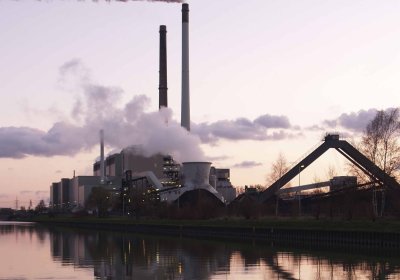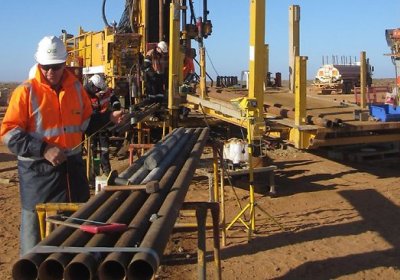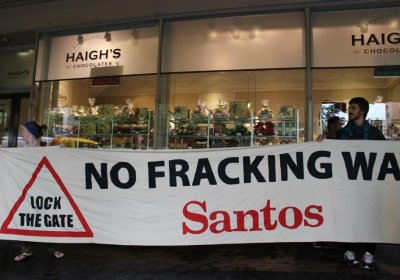As South Australia's economy continues to tank, local business leaders and the state Labor government have snatched at the nuclear option.
Leading the hopes for salvation is a proposal for a giant underground waste dump to store some of the world's spent reactor fuel.
Renfrey Clarke
As a sagging economy cruelled their electoral chances, right-wing parliamentarians and power-brokers in the South Australian Labor Party decided in late 2014 that it was time to ditch a once fiercely-defended point of policy. The party's remaining opposition to the nuclear fuel cycle would have to go.
Labor Premier Jay Weatherill soon came on board, and by March last year the state's Nuclear Fuel Cycle Royal Commission was under way.
If modern industrial capitalism were a person, he or she would be on suicide watch. The system that has brought us quantum physics and reality television, modern medicine and the columns of Andrew Bolt is set on a course which, by all the best reckoning, points directly to its doing itself in.
If capitalism goes on — everything goes. Climate, coastlines, most living species, food supplies, the great bulk of humanity. And certainly, the preconditions for advanced civilisation, perhaps forever.
To get elected, wait until the existing government makes itself unelectable. Say as little as you can about your real policies. Smile, and present a small target.
Those were the perspectives of South Australia’s Liberal opposition in the run-up to the state elections on March 15. The key Liberal slogan, outside polling places throughout the state, was “A Fresh Start”. A start to what, specifically? Voters weren’t supposed to ask.
First there was climate denial. But the mocking laughter of the informed public – along with the indignation of the scientists – finally reached the energy-company boardrooms.
So now instead we get the non sequitur. That’s Latin for “it doesn’t follow”. Rather than lying outright, the fossil-fuel chiefs make nakedly contradictory statements and count on us not to notice.
Outside the city of Port Augusta in South Australia, the firm Alinta Energy runs the ageing brown coal-fired Northern power station. Environmentalists and local campaigners want the plant replaced with state-of-the-art solar power generation. But Alinta would rather solar power were used to pre-heat water for the existing plant, which would then stay in operation for further decades.
Kevin Anderson, professor of energy and climate change at Manchester University, said on October 29 last year: “Today, after two decades of bluff and lies, the remaining 2°C budget demands revolutionary change to the political and economic hegemony.”
Anderson is one of Britain’s most eminent climate scientists. He is also deputy director of the Tyndall Centre for Climate Change Research.
Tyndall Centre senior research fellow and Manchester University reader Alice Bows-Larkin was more blunt in a November interview: “We need bottom-up and top-down action. We need change at all levels.”
For anyone who knows the science, it’s settled — fossil fuels need to be banished fast from our energy mix. But how do we achieve it? Can we rely on renewable sources such as wind and solar? Or must humanity turn to nuclear power?
That’s a controversy that has bubbled away for years among people who all accept the dangers of global warming. Now, from the energy sector in China, there’s hard new evidence bearing on this debate.
The experience in China shows that as a way of quickly replacing greenhouse-polluting fuels, renewable energy wins against nuclear, hands down.
“It’s move over Olympic Dam with a massive shale oil find confirmed for Linc Energy in South Australia, which sent its share price into orbit,” the ABC’s The Business said on January 29, exulting at a big discovery of unconventional oil and gas near the remote town of Coober Pedy, 800 kilometres north-west of Adelaide.
As the fossil fuel lobby tells it, natural gas — in chemical terms, almost all methane — is clean and green. Burn it in a modern power plant, and per unit of electricity produced, only about half as much carbon dioxide is sent up the exhaust stack compared to good-quality coal.
That’s like saying you’re making progress if you get off heroin onto amphetamines. Natural gas is still a fossil fuel. Even if the sums worked the way the gas corporations suggest, a wholesale switch to gas would put off climate disaster only by a few decades.
In Port Pirie, an industrial centre 220 kilometres north of Adelaide in South Australia, more than half of two-year-olds suffer from lead poisoning at a level consistent with later behavioural problems and loss of learning ability. The problem is more than twice as bad as anywhere else in Australia, including such lead-polluted cities as Mt Isa and Broken Hill.
Australian gas company Santos have recently commenced commercial drilling for shale gas in the Cooper Basin in Moomba, South Australia. Like coal seam gas, shale gas is a form of unconventional gas that requires "fracking" to release it.
The Climate Emergency Action Network (CLEAN) held a protest on December 14 in front of Christmas shoppers in Adelaide's Rundle Mall, before marching to Santos HQ. Their message to the SA state government was: "No to unconventional gas - Yes to renewables".
The text below is a speech given at the protest by CLEAN activist Gemma Weedall.
***
- Previous page
- Page 5
- Next page











